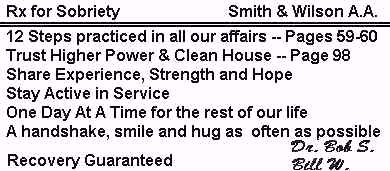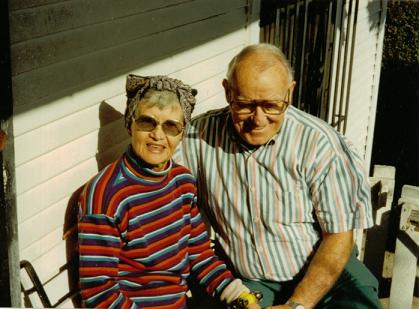

 Click The Images To Go To Page Indicated In The Flag
The First Woman in A.A. West of the Mississippi by Nancy O.
Sybil C. Sybil C. was the first woman to enter A.A. west of the Mississippi. Her date of sobriety was March 21, 1941. Her name at the time was Sybil Maxwell, though she later opened her talks by saying, "My name is Sybil Doris Adams Stratton Hart Maxwell Willis C., and I'm an alcoholic." She was born Sybil Doris Adams on May 20, 1908, in the small oil town of Simians, Texas. Her parents were poor but hardworking and she had a brother Herman, ten years her senior. Herman was called "Tex." Sybil adored her big brother. She remembered that when she was five and he fifteen, he would hold her and rock her to sleep. Tex joined the Army during World War I, was reported missing in action, and when the family heard nothing further they assumed he was dead. However, when Sybil was thirteen they learned that he was alive and living in Los Angeles. The family immediately moved to California. Sybil felt like a misfit in Los Angeles. She affected the flapper makeup popular at the time: heavy white powder on her face, and two big red spots of rouge on her cheeks and lots of lipstick and black eyebrows. "I must have looked like a circus freak or something like that," she wailed. "I was in eighth grade out there in Los Angeles, and the other kids laughed at me. I had trouble making friends, being shy and timid by nature, but also my papa wouldn't let boys even walk home with me, let alone go to parties. I just wasn't allowed to do anything, and I knew I didn't belong anywhere." "So naturally I started drinking at a very early age, against my better judgment, full of shame and remorse because of Papa's teachings. He was a good man. When I was fifteen, I got drunk one night, passed out, and had to be carried home and put to bed in my mother's bed. I cried the next day and promised that it would never happen again -- and I meant it. But I didn't know myself, I didn't know the disease of alcoholism. The next Saturday night the kids handed me a bottle and I drank it. And I continued to do that through a couple of semesters of high school, and I stayed drunk through seventeen years of failed marriages and more jobs than I can count." Sybil dropped out of high school and took a secretarial course and was hired as a secretary. It was the first in a long list of jobs. At various times she was a real estate broker, a taxi driver, a bootlegger, an itinerant farm worker, the editor of a magazine for pet owners, and a salesperson. 'I didn't mind working," she said, "but I never seemed to get anywhere. I was just on a treadmill because of booze." She had a child by her first husband, a sailor. She thought having the child would prevent her drinking, but she drank more than ever, and her parents eventually took the child from her. She and her husband hitchhiked out of town to find grape picking jobs. They thought getting away from their city friends would help them quit drinking, but she soon was drunk again. During one of her drunks she heard music. At first she thought she was hallucinating, but she followed the sound and wandered into a tent where a revival meeting was in progress. The preacher asked for anyone to come forward who wanted to be saved. "Well, that was me," Sybil told A.A. members. "I went all the way down while the people were singing. The preacher put his hand out and placed it on my head, and I threw up all over him. It was so terrible! I was so ashamed, I couldn't bring myself to tell anyone about it until I got into Alcoholics Anonymous eleven years later." She left her sailor husband and hitchhiked back to Los Angeles to her mother's house. Her brother, Tex, now had a speakeasy on skid row, and to make money to take to her mother to support the child, she went into the bootlegging business with him. Eventually the speakeasy was raided and they were out of business. Then she went to work in a taxi-dance hall. Little is known of her second husband, but she met her third husband, Dick Maxwell, while working in the taxi-dance hall. One night a rich, handsome stranger walked in and bought dance tickets with Sybil for the whole night. During intermission he bought several pitchers of beer (the girls got a dollar for every pitcher their partner bought), and she told him her sad story. He offered to marry her and adopt her child if she would promise not to drink any more. Now she had a wonderful husband, a home, a housekeeper, and a car. But she couldn't stop drinking. In 1939, while visiting her mother, she read the Liberty magazine article called "Alcoholics and God." She thought the story fascinating but did nothing about it and her downward spiral continued. Eighteen months later God gave her another chance, when she read the Saturday Evening Post's March 1, 1941 issue which contained the famous Jack Alexander article about A.A.. She wrote to New York and received a reply from Ruth Hock, then Bill Wilson's secretary, who told her that there were no women members in California, but that Marty Mann was sober in New York. Ruth referred her to the small group of men then in the area. On Friday, March 23, Sybil's nonalcoholic husband, Dick Maxwell, drove her to the meeting. They found ten or twelve men seated around a table and three or four women seated against the wall. When the chairman began the meeting he announced "As is our custom before the regular meeting starts, we have to ask the women to leave." Sybil left with the other women but her husband stayed and the members assumed he was the alcoholic. When he rejoined Sybil he said "They don't know you're alive. They just went on and on bragging about their drinking until I was about to walk out, when they jumped up and said the Lord's Prayer, and here I am." Sybil headed for the nearest bar and got drunk. But she remembered that Ruth Hock had written, "If you need help, call Cliff W." and had given her his phone number. He explained: " You didn't tell us you were an alcoholic. We thought you were one of the wives. If you had identified yourself as an alcoholic, you would have been welcome as the flowers in May." When she returned the following week, Frank R. brought in a large carton full of letters bundled into bunches of twenty to fifty. He explained that they were all inquiries and calls for help from people in southern California. "Here they are! Here they are! If any of you jokers have been sober over fifteen minutes, come on up here and get these letters. We've got to get as many of these drunks as we can in here by next Friday, or they may die." The last bundle was of letters from women. Frank said: "Sybil Maxwell, come on up. I am going to put you in charge of all the women." Sybil liked the idea of "being in charge" but replied, "I can't, sir. You said I have to make all those calls by next Friday, or somebody might die. Well, I'll be drunk by next Friday unless you have some magic that will change everything so I can stay sober." Frank explained that everything she needed to know was in the Big Book. "And it says right in here that when all other measures fail, working with another alcoholic will save the day. That's what you will be doing, Sybil, working with other alcoholics. You just get in your car and take your mind off yourself. Think about someone sicker than you are. Go see her and hand her the letter she wrote, and say: 'I wrote one like this last week, and they answered mine and told me to come and see you. If you have a drinking problem like I have, and if you want to get sober as bad as I do, you come with me and we'll find out together how to do it.' Don't add another word to that, because you don't know anything yet. Just go get 'em." It worked, and she never had another drink. When Bill and Lois Wilson made their first visit to Los Angeles in 1943, Sybil was one of the delegation of local A.A.'s who met them at the Town House hotel. Later she met Marty Mann. But Dick Maxwell began to feel abandoned and lonely. He urged her to cut down on her A.A. activities so that they could have more of a home life. He had grown to hate A.A. and refused to read the Big Book or discuss the Twelve Steps. Finally he suggested that the solution to their marriage problems was for her to go back to drinking and he would take care of her. Sybil quickly packed a bag and left. She left her lovely home and rented a housekeeping room with a gas hotplate and a bath down the hall for nine dollars a week and went to work for the L.A. Times to support herself. "A.A. just had to come first with me," she explained. Her brother, Tex, joined the week after she did. He started the second A.A. group in the area, and appointed Sybil coffeemaker and greeter for the new group, and finally made her deliver her first shaky talk. When Tex died in 1952, Sybil was devastated. She wrote Bill Wilson, pouring out her grief and asked, "What am I going to do, Bill? I don't crave a drink, but I think I'm going to die unless I get some answers." She said Bill's answer saved her life. He wrote:
The letter touched Sybil so deeply she gave many copies to people who were at a low point in life, and a few years ago someone I met at an on-line meeting sent a copy to me. At the time of the letter, she was married to Jim Willis, the founder of Gamblers' Anonymous. Sybil is perhaps best remembered as the first executive secretary of the Los Angeles Central office of A.A., a position she held for twelve years. This was a turbulent time for A.A., with much disunity and controversy within the groups that led to the Twelve Traditions. Sybil remembered that the groups regarded them either with opposition or indifference and the Central Office couldn't sell many copies of the Traditions pamphlet. Understandably, since Sybil began doing Twelfth Step work immediately, she took a dim view of the rigidity that crept into the requirements. Some areas required six months or even a year or sobriety before one was allowed to call on new prospects. She advised "If you don't get prospects from the Central Office, look around the meeting rooms. There is always the forgotten man or woman, nervous and scared, who would love to have you come up and shake hands. Just feel what the new person is feeling. It kept me sober, it kept my brother Tex sober, and it will keep you sober when all other measures fail." Her fifth and enduring marriage was to another A.A. member, Bob C. He has been described a "a high-spirited, warm, and loving man, fourteen years her junior in age and twenty-two years her junior in sobriety." "Bob and I are very happy," Sybil declared. "This has been the best years of my life." They were both enthusiastic meeting-goers and enjoyed an incredibly wide circle of A.A. friends. Sybil was honored at the International A.A. Convention in Montreal in 1985. She was then the longest-sober living woman in A.A. When she was introduced to the 50,000 attendees from fifty-three countries, she told the colorful story of A.A.'s beginning in Los Angeles, in which she had played such a vital role. When she finished her talk, the audience rose to its feet as one and gave her a standing ovation which continued so long that some thought it would never stop.
Sybil died in 1998.
 Sybil and Bob Corwin on the porch Photo courtesy of Matt M. One of Sybil's Last Sponsees
Sources:
Index of A.A. History Pages on Barefoot's World
As in so many things, especially with we alcoholics, our History is our Greatest Asset!.. We each arrived at the doors of A.A. with an intensive and lengthy "History of Things That Do Not Work" .. Today, In A.A. and In Recovery, Our History has added an intensive and lengthy "History of Things That DO Work!!" and We will not regret the past nor wish to shut the door on it!!
ABC Page 60 -- Barefoot's Recovery Pages
KEEP COMING BACK!
On the Web Jan 8, 2002 in the Spirit of Cooperation Three mighty important things, Pardn'r, LOVE And PEACE and SOBRIETY |


